Top 10 Most Fascinating Myths of Ancient Rome
A people known for their military, political, and social institutions, the ancient Romans conquered vast amounts of land in Europe and northern Africa, built roads and aqueducts, and spread Latin, their language, far and wide. They are also known for their interesting mythology, which is based on Greek mythology. Here are the most fascinating myths of ancient Rome.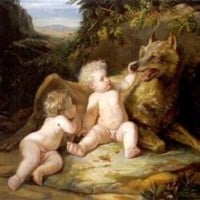
The image of a she-wolf suckling the twin brothers Romulus and Remus in their infancy has been a symbol of the city of Rome and the ancient Romans since at least the 3rd century BC. They were abandoned by their parents as babies and put into a basket that was then placed into the River Tiber. The basket ran aground and the twins were discovered by a female wolf. The wolf nursed the babies for a short time before they were found by a shepherd.
It's interesting to think what that said about the Roman's that they were proud to claim their founders were raised by a wolf.
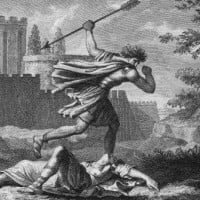
One of the most famous myths of ancient Rome is how the city was founded. When Romulus and Remus became adults, they decided to found a city where the wolf had found them. Unfortunately, they couldn't agree on a location, so they decided that each of them would pick a spot and wait for an auspicious signal from the Gods showing a divine preference for one or the other. Remus placed himself on the Aventine Hill and quickly saw a flock of 6 birds. Romulus places himself on the Palatine Hill and quickly after his brother spotted a flock of 12. Remus claimed he saw the birds first but Romulus that he saw the highest numbers of birds. Their argument ended in a fight which resulted in Romulus killing his brother Remus, becoming the sole founder of the city which he named after himself: Rome.
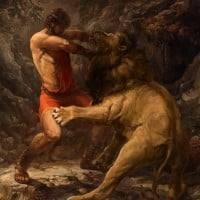
Like many things in Roman mythology, the Twelve Labors of Hercules were taken from Greek mythology, in which he is called Heracles. These labors were a form of penance for something Heracles had done, although it was not his fault. The goddess Hera did not like Heracles ever since his birth and so she induced a madness in him that made him kill his wife and children. Afterwards, Heracles went to the Oracle of Delphi to atone, where he prayed to the god Apollo for guidance. Heracles was told to serve Eurystheus, king of Mycenae, for ten years. During this time, he was sent to perform a series of difficult feats, called labors. His tasks are listed as follows:
1- Slay the Nemean lion.
2- Slay the nine-headed Lernaean Hydra.
3- Capture the Ceryneian Hind.
4- Capture the Erymanthian Boar.
5- Clean the Augean stables in a single day.
6- Slay the Stymphalian birds.
7- Capture the Cretan Bull.
8- Steal the Mares of Diomedes.
9- Obtain the girdle of Hippolyta, queen of the Amazon.
10- Obtain the cattle of the three-bodied giant Geryon.
11- Steal three of the golden apples of the Hesperides.
12- Capture and bring back Cerberus.
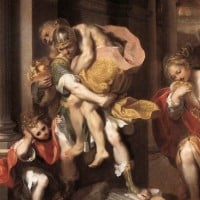
Aeneas, a mythical hero of Troy and Rome, is the son of the goddess Aphrodite (Venus) and Anchises. Aeneas was a member of the royal line at Troy and cousin of Hector. He played a prominent part in defending his city against the Greeks during the Trojan War, being second only to Hector in ability. Aeneas is the hero of a huge epic poem called the Aeneid by Roman poet Virgil. Like the Odyssey, this is another ancient work about the iconic Trojan Wars. In the Aeneid, Virgil describes him as a hero and the ancestor of Romulus and Remus. The Aeneid tells that Aeneas was one among the few Trojans who were neither killed nor enslaved after Troy was defeated. After gathering a group and being commanded by the gods to flee, he traveled to Italy to become the progenitor of the Romans. He carried with him the statues of Trojan gods and planted them in Italy.
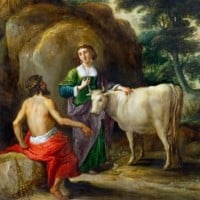
Io was a priestess of the Roman goddess Juno. Juno was the jealous wife of Jupiter, the king of the gods. Jupiter fell in love with Io and changed himself into a black cloud so that he could live closer to her while hiding from his wife Juno. However, Juno quickly recognized the black cloud was her husband. When Juno arrived on Earth, Jupiter changed Io into a white cow so as to protect her from his wife's wrath. Despite several attempts to conceal Io, Juno found the white cow and put it under the surveillance of Argus who had a hundred eyes which were hardly ever closed. To free Io, Jupiter sent his son Mercury to tell stories to Argus until he fell asleep. He was successful in killing Argus and freeing Io.
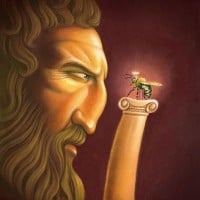
Some legends teach us life lessons and this one is no different. One day after being irritated by the mortals taking away her honey, the queen of the hive decided to visit Jupiter. The bee asked Jupiter to give her a stinger. She would use it to keep people away from her honey. She would sting people who tried to take honey from her. Jupiter did not like this idea because he loved people. He still did grant her wish, but at the risk of her own life. This story is a way of explaining why bees die after stinging someone. The moral of this story is: revenge can have dire consequences.
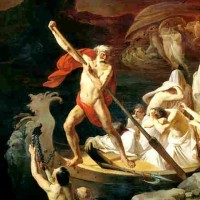
According to Roman myth, anyone who dies has to travel to the underworld. First, the dead have to cross the Styx, also known as the River of the Dead. The dead person is buried with a coin to pay the ferrymen Charon for the ride across the river. The coin has to be kept in the mouth of the deceased, and only then will Charon transport their soul across.
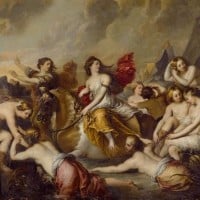
Cloelia was a legendary woman from the early history of ancient Rome. She was was a legendary woman from the early history of ancient Rome. She was one of the women taken hostage by Lars Porsena, as a part of the peace treaty which ended the war between Rome and Clusium in 508 BC. She escaped from the Etruscan camp, leading away a group of Roman virgins. She escaped on a horse and swam across the River Tiber. Lars Porsena then made a condition for her return. On her return, Porsena was so impressed by her courage that he granted her wish to take half of the hostages. She chose the young Roman men so that the war could be continued. Her wit and bravery was invaluable to the Romans and in her honor, an equestrian statue was built at Via Sacra.

Lucretia was the legendary heroine of Rome whose death was believed changed the Roman government from a monarchy to a republic. According to the story, Lucretia was a Roman matron whose beauty caught the attention of Sextus Tarquinius, the son of the seventh King of Rome, Tarquinius Superbus. Married and uninterested in an affair, Lucretia refused Sextus' advances but he didn't accept her refusal and violated her agains her will. Lucretia told her husband about the violence and, in despair, took her own life. The consequence was that all prominent and influential families formed a republic against the king and his son, overthrowing them.
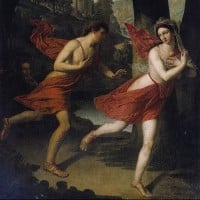
Apollo is present in both the Greek and the Roman pantheon and mythology. He at one point was in love with Cassandra, the daughter King Priam who was known as the most beautiful of the king's daughters. Apollo decided to declare his love for her and promised her the power of prophecy, as long as she agreed to do anything he desired. She agreed, but once she got her wish she refused to unite with Apollo which made him very angry, so much so that he cursed Cassandra so that nobody would believe her prophecies. She was considered a liar and a crazy person. Not even her father believed her, and imprisoned her in a citadel. Her most famous prophecy was the attack of the Greeks against Troy. Nobody believed her, and the city was destroyed.
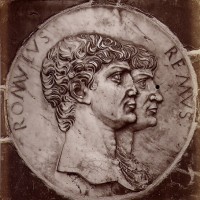
After a reign of thirty-seven years, Romulus is said to have disappeared in a whirlwind during a sudden and violent storm. It is said that Romulus was either murdered by the senators, torn apart out of jealousy, or was raised to heaven by Mars, the god of war, and became a god named Quirinus. This event is recorded as taking place neat the River Tiber, where we now see the Mausoleum of Augustus.
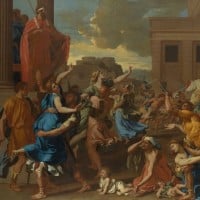
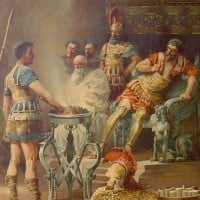
Scaevola, Gaius Mucius Scaevola being his full name, is known as a hero of ancient Rome. In 508 BC, Rome at the time was at war with the Etruscans and he volunteered to assassinate the Etruscan king, Lars Porsena. When he arrived at the camp where the king was staying, unfortunately for him he killed the king's scribe instead who happened to be wearing the same outfit. When he was captured, he uttered the famous words:
"I am Gaius Mucius, a citizen of Rome. I came here as an enemy to kill my enemy, and I am as ready to die as I am to kill. We Romans act bravely and, when adversity strikes, we suffer bravely." Then, after telling the king that 300 other young roman men are also willing to do this job, he stuck his right hand into a brazier, but showed no pain in doing so. This is how he got his nickname "Scaevola" which means "left-handed". Afterwards, the king was so impressed by his bravery that he let him go back to Rome.
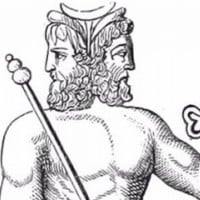
In ancient Roman mythology, Janus is the is the god of beginnings, gates, transitions, time, duality, doorways, passages, frames, and endings. He is usually depicted as having two faces. There is no counterpart for Janus in Greek mythology. He is entirely from Roman mythology.